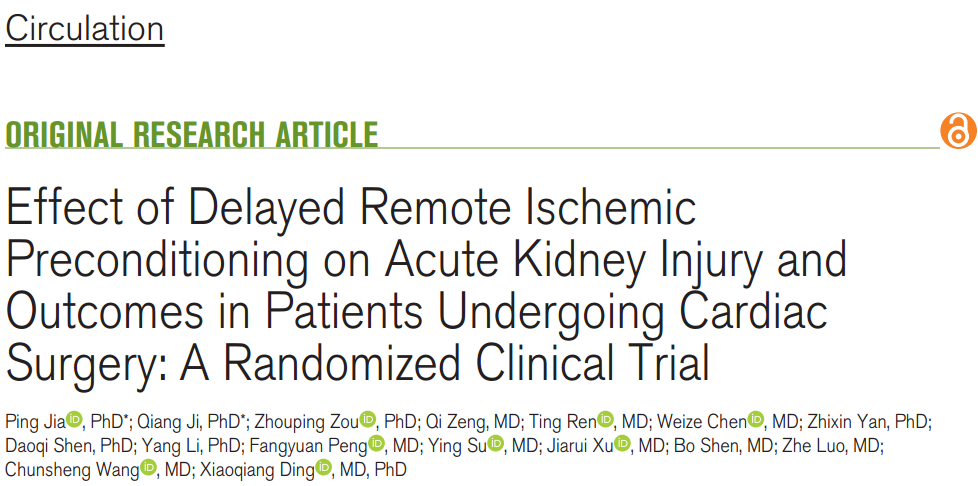Acute kidney injury, as a common acute and critical clinical condition, has a morbidity rate of about 12% in hospitalized patients, especially after cardiac surgery, the morbidity rate can be as high as 30% to 50%, which has become one of the most important factors of patients' postoperative death. This complication not only prolongs the patient's hospitalization time and increases medical costs, but also may lead to nephropathy uremia, increase the probability of recurrence of heart disease, and seriously threaten the patient's health.
However, for a long time, the prevention and treatment of acute kidney injury have mainly relied on expensive blood purification and supportive therapy, and there is a lack of effective, safe and economical means of prevention.
On October 22, a research team, published a paper entitled “Effect of Delayed Remote Ischemic Preconditioning on Acute Kidney Injury and Outcomes” in the international authoritative journal Circulation (IF=35.5). in Patients Undergoing Cardiac Surgery: A Randomized Clinical Trial on the Effect of Delayed Remote Ischemic Preconditioning on Acute Kidney Injury and Outcomes” in the journal Circulation (IF=35). The study innovatively utilized late remote ischemic pre-adaptation to successfully reduce the incidence of postoperative acute kidney injury (AKI) after cardiac surgery, and opened up a new pathway for the prevention of AKI after cardiac surgery that is simple, cost-effective, and safe.

Remote Ischemic Preconditioning (RIPC) is a method to stimulate the tolerance of human tissues and organs to ischemia by preadministering transient ischemia to the distal tissues, so as to protect the distal organs.The organ-protecting effect of RIPC has two time windows: the early stage (functioning within 2-4 hours, with a brief maintenance time) and late (acting after 18-24 hours and lasting 48-72 hours). Most previous studies have focused on early RIPC, showing a controversial role in preventing acute kidney injury after cardiac surgery. Through a series of preclinical studies, the team has confirmed that remote ischemic preadaptation can significantly reduce acute kidney injury caused by a variety of etiologies, including ischemia and infection; and through a series of basic studies, the team has proposed the innovative theory that immunity and energy metabolism pattern switching mediate the renoprotective effect of remote ischemic preadaptation. Based on the original research results, they innovatively established the late remote ischemic pre-adaptation technique and applied it to the prevention of acute kidney injury. Together with the cardiac surgery and cardiac intensive care center teams, they conducted a clinical study on remote ischemic pre-adaptation for the prevention of acute kidney injury after cardiac surgery.
To validate the effectiveness of this technique, the team designed a large-sample prospective double-blind randomized controlled clinical trial that included 509 cardiac surgery patients. The results of the study showed that patients who received remote ischemic preadaptation had a 22.9% reduction in the incidence of postoperative acute kidney injury, and the effect was even more pronounced in patients at high risk of developing the condition, such as the elderly and hypertensive patients. This finding not only provides new ideas and methods for the prevention of acute kidney injury, but also brings benefits to cardiac surgery patients in general.
Members of the team said, “The success of this study is the culmination of more than 20 years of hard work by our team. We hope that through this innovative technology, we can reduce the incidence of acute kidney injury and alleviate the pain and financial burden of patients, as well as provide new lessons and insights for the medical community in the field of acute kidney injury prevention.




Post comments